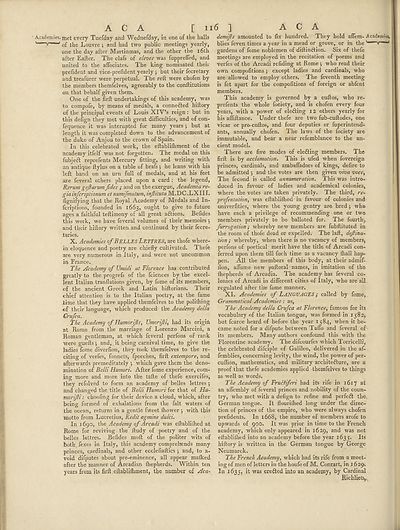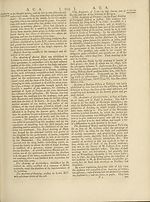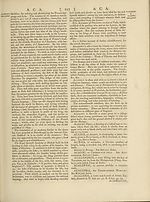Encyclopaedia Britannica, or, a Dictionary of arts, sciences, and miscellaneous literature : enlarged and improved. Illustrated with nearly six hundred engravings > Volume 1, A-AME
(134) Page 116
Download files
Complete book:
Individual page:
Thumbnail gallery: Grid view | List view

A C A [n
Academies, met every Tuefday and Wednefday, in one of the halls
J of the Louvre 5 and had two public meetings yearly,
one the day after Martinmas, and the other the 16th
after Eafter. The clafs of e/eves was fuppreffed, and
united to the affociates. The king nominated their
prefident and vice-prefident yearly j but their fecretary
and treafurer were perpetual. The reft were chofen by
the members themfelves, agreeably to the conftitutions
on that behalf given them.
One of the firft undertakings of this academy, was
to compofe, by means of medals, a connefted hiftory
of the principal events of Louis XIV’s reign : but in
this defign they met with great difficulties, and of con-
fequence it was interupted for many years ; but at
length it was completed down to the advancement of
the duke of Anjou to the crown of Spain.
In this celebrated work, the eftablilhment of the
academy itfelf was not forgotten. The medal on this
fubjeft reprefents Mercury fitting, and writing with
an antique ftylus on a table of brafs j he leans with his
left hand on an urn full of medals, and at his feet
are feveral others placed upon a card : the legend,
Rerum gejlarum Jides ; and on the exergue. Academia re¬
gia inf criptionum et numifmatum, injlituta M.DC.LX 111.
lignifying that the Royal Academy of Medals and In-
fcriptions, founded in 1663, ought to give to future
ages a faithful teftxmony of all great adlions. Befides
this work, we have feveral volumes of their memoirs ;
and their hiftory written and continued by their fecre-
taries.
X. Academies of BELLES LETTRES, are thofe where¬
in eloquence and poetry are chiefly cultivated. Thefe
are very numerous in Italy, and were not uncommon
in France.
The Academy of Umidi at Florence has contributed
greatly to the progrefs of the fciences by the excel¬
lent Italian tranflations given, by fome of its members,
of the ancient Greek and Latin hiftorians. Their
chief attention is to the Italian poetry, at the fame
time that they have applied themfelves to the poliftiing
of their language, which produced the Academy della
Crufca.
The Academy of Humor if s, Umorifli, had its origin
at Rome from the marriage of Lorenzo Marcini, a
Roman gentleman, at Avhich feveral perfons of rank
■were guefts; and, , it being carnival time, to give the
ladies fome diverfion, they took themfelves to the re¬
citing of verfes, fonnets, fpeeches, firft extempore, and
afterwards premeditately ; which gave them the deno¬
mination of Belli Humori. After fome experience, com¬
ing more and more into the tafte of thefe exercifes,
they refolved to form an academy of belles lettres •,
and changed the title of Belli Humori for that of Hu¬
mor i/I i: choofing for their device a cloud, which, after
being formed of exhalations from the fait waters of
the ocean, returns in a gentle fweet (bower j with this
motto from Lucretius, Redit agmine dulci.
In 1690, the Academy of Arcadi was eftablifhed at
Rome for reviving the ftudy of poetry and of the
belles lettres. Befides mod of the politer wits of
both.fexes in Italy, this academy compreliends many
princes, cardinals, and other ecclefiaftics ; and, to a-
void difputes about pre-eminence, all appear mafked
after the manner of Arcadian (hepherds. Within ten
years from its firft eftabliftiment, the number of Aca-
6 ] ACA
demifs amounted to fix hundred. They hold affem- Academies,
blies feven times a year in a mead or grove, or in the » J
gardens of fome noblemen of diftinftion. Six of thefe
meetings are employed in the recitation of poems and
verfes of the Arcadi redding at Rome ; who read their
own compofitions 5 except ladies and cardinals, who
are allowed to employ others. The feventh meeting
is fet apart for the compofitions of foreign or abfent
members.
This academy is governed by a cuftos, who re¬
prefents the whole fociety, and is chofen every four
years, with a power of electing 12 others yearly for
his affiftance. Under thefe are two fub-cuftodes, one
vicar or pro-cuftos, and four deputies or fuperintend-
ants, annually chofen. The laws of the fociety ate
immutable, and bear a near refemblance to the an¬
cient model.
There are five modes of elefling members. The
firft is by acclamation. This is ufed when fovereign
princes, cardinals, and ambafladors of kings, defire to
be admitted *, and the votes are then given viva vocet
The fecond is called annumeration. This was intro¬
duced in favour of ladies and academical colonies,
where the votes are taken privately. The third, re-
prefentation, was eftabliftied in favour of colonies and
univerfities, where the young gentry are bred j wh©
have each a privilege of recommending one or two
members privately to be balloted for. The fourth^
furrogation; whereby new members are fubftituted in
the room of thofe dead or expelled. The laft, dejlina-
tion ; whereby, when there is no vacancy of members,
perfons of poetical merit have the title of Arcadi con¬
ferred upon them till fuch time as a vacancy (hall hap¬
pen. All the members of this body, at their admif-
fion, alfume new paftoral names, in imitation of the
(hepherds of Arcadia. The academy has feveral co¬
lonies of Arcadi in different cities of Italy, who are all
regulated after the fame manner.
XL Academies of LANGUAGES; called by fome,
Grammatical Academies: as,
The Academy della Crufca at Florence, famous for its
vocabulary of the Italian tongue, was formed in 1582,
but fcarce heard of before the year 1584, •when it be¬
came noted for a difpute between Taffo and feveral of
its members. Many authors confound this with the
Florentine academy. The difeourfes which Torricelli,
the celebrated difciple of Galileo, delivered in the af-
femblies, concerning levity, the wind, the power of per-
cuffion, mathematics, and military architefture, are a
proof that thefe academies applied themfelves to things
as well as words.
The Academy of Frucliferi had its rife in 1617 at
an affembly of feveral princes and nobility of the coun¬
try, who met with a defign to refine and perfeft the,
German tongue. It flouriftied long under the direc¬
tion of princes of the empire, who were always chofen
prefidents. In 1668, the number of members arofe to
upwards of 900. It was prior in time to the French
academy, which only appeared in 1629, and was not
eftabliftied into an academy before the year 1635. Its
hiftory is written in the German tongue by George
Neumarck.
The French Acade/ny, which had its rife from a meet¬
ing of men of letters in the houfe of M. Conrart, in 162cy.
In 1635, it was erected into an academy, by Cardinal
Richlieu*
Academies, met every Tuefday and Wednefday, in one of the halls
J of the Louvre 5 and had two public meetings yearly,
one the day after Martinmas, and the other the 16th
after Eafter. The clafs of e/eves was fuppreffed, and
united to the affociates. The king nominated their
prefident and vice-prefident yearly j but their fecretary
and treafurer were perpetual. The reft were chofen by
the members themfelves, agreeably to the conftitutions
on that behalf given them.
One of the firft undertakings of this academy, was
to compofe, by means of medals, a connefted hiftory
of the principal events of Louis XIV’s reign : but in
this defign they met with great difficulties, and of con-
fequence it was interupted for many years ; but at
length it was completed down to the advancement of
the duke of Anjou to the crown of Spain.
In this celebrated work, the eftablilhment of the
academy itfelf was not forgotten. The medal on this
fubjeft reprefents Mercury fitting, and writing with
an antique ftylus on a table of brafs j he leans with his
left hand on an urn full of medals, and at his feet
are feveral others placed upon a card : the legend,
Rerum gejlarum Jides ; and on the exergue. Academia re¬
gia inf criptionum et numifmatum, injlituta M.DC.LX 111.
lignifying that the Royal Academy of Medals and In-
fcriptions, founded in 1663, ought to give to future
ages a faithful teftxmony of all great adlions. Befides
this work, we have feveral volumes of their memoirs ;
and their hiftory written and continued by their fecre-
taries.
X. Academies of BELLES LETTRES, are thofe where¬
in eloquence and poetry are chiefly cultivated. Thefe
are very numerous in Italy, and were not uncommon
in France.
The Academy of Umidi at Florence has contributed
greatly to the progrefs of the fciences by the excel¬
lent Italian tranflations given, by fome of its members,
of the ancient Greek and Latin hiftorians. Their
chief attention is to the Italian poetry, at the fame
time that they have applied themfelves to the poliftiing
of their language, which produced the Academy della
Crufca.
The Academy of Humor if s, Umorifli, had its origin
at Rome from the marriage of Lorenzo Marcini, a
Roman gentleman, at Avhich feveral perfons of rank
■were guefts; and, , it being carnival time, to give the
ladies fome diverfion, they took themfelves to the re¬
citing of verfes, fonnets, fpeeches, firft extempore, and
afterwards premeditately ; which gave them the deno¬
mination of Belli Humori. After fome experience, com¬
ing more and more into the tafte of thefe exercifes,
they refolved to form an academy of belles lettres •,
and changed the title of Belli Humori for that of Hu¬
mor i/I i: choofing for their device a cloud, which, after
being formed of exhalations from the fait waters of
the ocean, returns in a gentle fweet (bower j with this
motto from Lucretius, Redit agmine dulci.
In 1690, the Academy of Arcadi was eftablifhed at
Rome for reviving the ftudy of poetry and of the
belles lettres. Befides mod of the politer wits of
both.fexes in Italy, this academy compreliends many
princes, cardinals, and other ecclefiaftics ; and, to a-
void difputes about pre-eminence, all appear mafked
after the manner of Arcadian (hepherds. Within ten
years from its firft eftabliftiment, the number of Aca-
6 ] ACA
demifs amounted to fix hundred. They hold affem- Academies,
blies feven times a year in a mead or grove, or in the » J
gardens of fome noblemen of diftinftion. Six of thefe
meetings are employed in the recitation of poems and
verfes of the Arcadi redding at Rome ; who read their
own compofitions 5 except ladies and cardinals, who
are allowed to employ others. The feventh meeting
is fet apart for the compofitions of foreign or abfent
members.
This academy is governed by a cuftos, who re¬
prefents the whole fociety, and is chofen every four
years, with a power of electing 12 others yearly for
his affiftance. Under thefe are two fub-cuftodes, one
vicar or pro-cuftos, and four deputies or fuperintend-
ants, annually chofen. The laws of the fociety ate
immutable, and bear a near refemblance to the an¬
cient model.
There are five modes of elefling members. The
firft is by acclamation. This is ufed when fovereign
princes, cardinals, and ambafladors of kings, defire to
be admitted *, and the votes are then given viva vocet
The fecond is called annumeration. This was intro¬
duced in favour of ladies and academical colonies,
where the votes are taken privately. The third, re-
prefentation, was eftabliftied in favour of colonies and
univerfities, where the young gentry are bred j wh©
have each a privilege of recommending one or two
members privately to be balloted for. The fourth^
furrogation; whereby new members are fubftituted in
the room of thofe dead or expelled. The laft, dejlina-
tion ; whereby, when there is no vacancy of members,
perfons of poetical merit have the title of Arcadi con¬
ferred upon them till fuch time as a vacancy (hall hap¬
pen. All the members of this body, at their admif-
fion, alfume new paftoral names, in imitation of the
(hepherds of Arcadia. The academy has feveral co¬
lonies of Arcadi in different cities of Italy, who are all
regulated after the fame manner.
XL Academies of LANGUAGES; called by fome,
Grammatical Academies: as,
The Academy della Crufca at Florence, famous for its
vocabulary of the Italian tongue, was formed in 1582,
but fcarce heard of before the year 1584, •when it be¬
came noted for a difpute between Taffo and feveral of
its members. Many authors confound this with the
Florentine academy. The difeourfes which Torricelli,
the celebrated difciple of Galileo, delivered in the af-
femblies, concerning levity, the wind, the power of per-
cuffion, mathematics, and military architefture, are a
proof that thefe academies applied themfelves to things
as well as words.
The Academy of Frucliferi had its rife in 1617 at
an affembly of feveral princes and nobility of the coun¬
try, who met with a defign to refine and perfeft the,
German tongue. It flouriftied long under the direc¬
tion of princes of the empire, who were always chofen
prefidents. In 1668, the number of members arofe to
upwards of 900. It was prior in time to the French
academy, which only appeared in 1629, and was not
eftabliftied into an academy before the year 1635. Its
hiftory is written in the German tongue by George
Neumarck.
The French Acade/ny, which had its rife from a meet¬
ing of men of letters in the houfe of M. Conrart, in 162cy.
In 1635, it was erected into an academy, by Cardinal
Richlieu*
Set display mode to:
![]() Universal Viewer |
Universal Viewer | ![]() Mirador |
Large image | Transcription
Mirador |
Large image | Transcription
Images and transcriptions on this page, including medium image downloads, may be used under the Creative Commons Attribution 4.0 International Licence unless otherwise stated. ![]()
| Permanent URL | https://digital.nls.uk/193133727 |
|---|
| Attribution and copyright: |
|
|---|
| Description | Ten editions of 'Encyclopaedia Britannica', issued from 1768-1903, in 231 volumes. Originally issued in 100 weekly parts (3 volumes) between 1768 and 1771 by publishers: Colin Macfarquhar and Andrew Bell (Edinburgh); editor: William Smellie: engraver: Andrew Bell. Expanded editions in the 19th century featured more volumes and contributions from leading experts in their fields. Managed and published in Edinburgh up to the 9th edition (25 volumes, from 1875-1889); the 10th edition (1902-1903) re-issued the 9th edition, with 11 supplementary volumes. |
|---|---|
| Additional NLS resources: |
|

